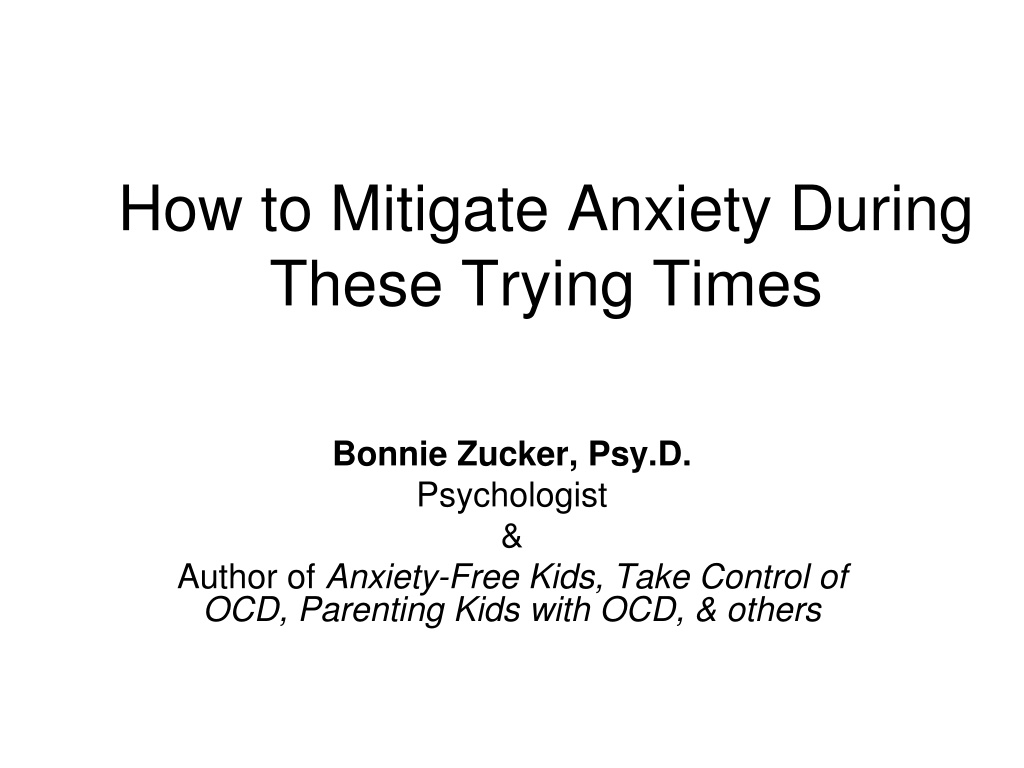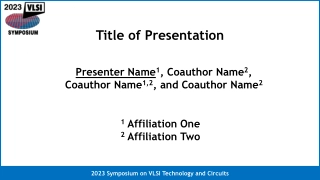Managing Anxiety in Challenging Times: Strategies and Facts
Understanding anxiety disorders, their prevalence, and treatment options such as Cognitive Behavioral Therapy (CBT) can help individuals cope effectively with anxiety. This overview explores the impact of anxiety, stress management techniques, and the importance of normalizing varying coping mechanisms during universally stressful times.
Download Presentation

Please find below an Image/Link to download the presentation.
The content on the website is provided AS IS for your information and personal use only. It may not be sold, licensed, or shared on other websites without obtaining consent from the author. Download presentation by click this link. If you encounter any issues during the download, it is possible that the publisher has removed the file from their server.
E N D
Presentation Transcript
How to Mitigate Anxiety During These Trying Times Bonnie Zucker, Psy.D. Psychologist & Author of Anxiety-Free Kids, Take Control of OCD, Parenting Kids with OCD, & others
Outline Understanding anxiety (treatment for anxiety disorders also works for transient anxiety) Treatment of anxiety (VERY brief overview) Stress Management & Healthy Coping (what is proven to work) Q & A
Anxiety Disorders Facts Most common form of psychopathology in children, adolescents, and adults Estimated 15-20% of children meet the criteria for an anxiety disorder Estimated 32% of US adolescents (aged 13-18) have an anxiety disorder Estimated 31% of US adults have an anxiety disorder at some time in their lifetime (about 23% serious impairment)
Anxiety Facts At this universally-stressful time, even those without anxiety disorders are anxious. Anxiety is contagious! (How many cans of beans do you have?) People in same household can have different worries and react in different ways; normalize this. Coping can vary and that is okay.
Anxiety Disorders Treatment Anxiety is very treatable; CBT is the most empirically supported approach to treating anxiety disorders in children & adults CBT is problem-focused, solution-oriented, and teaches coping strategies and techniques CBT is also beneficial for stress management and offers tools to be more aware of stress and take steps to cope/reduce stress symptoms.
Three Parts of Anxiety Body Behavior Thoughts
Body Thoughts Behavior
Sweaty Palms Fast Heart Beat Tense Muscles Stomachaches Body Worries Thinking Errors Negative Self-Talk Thoughts Avoidance Nervous Behaviors Behavior
Sweaty Palms Fast Heart Beat Tense Muscles Stomachaches Body Learn Relaxation and Calm Breathing Worries Thinking Errors Negative Self-Talk -Guided Imagery/Meditation/Yoga Thoughts Conquer Your Worries Identify and Replace Thinking Errors Positive Self-Talk Avoidance Nervous Behaviors Behavior Face Your Fears! Get Rid of Nervous Behaviors
Part 1: Body Teach lower diaphragmatic breathing: Slowly breathe in through your nose and breathe out through your mouth, allowing the air to go all the way down to your lower belly (smell the roses, blow out the candles) Demonstrate lower diaphragmatic breathing and have child practice (can use yoga mat and props if needed) One-nostril breathing: breathe in and out through only one nostril (hold other nostril closed and close mouth); need to do this for several minutes to be effective ** MASTER THIS FIRST when calm/ NOT anxious
Part 1: Body Relaxation APPS: CBT Tools for Youth Calm (calm.com) Insight Timer (Mooji: Nothing here but you; Tom Evans- Be Calm a Little Longer)
Part 1: Body Yoga/Meditation Mindfulness Awareness Meditation- become aware of awareness and enter a thoughtless, and thus restoring, state. Yoga: most types of yoga can help with reducing anxiety (Iyengar yoga); use Yoga Pretzels cards for kids (available on Amazon)
Part 2: Thoughts- A Resilience Mindset Resilience is being able to handle whatever comes your way. No matter what you have to deal with, you can handle it. This comes down to problem-solving, having a growth mindset, and being able to tolerate negative/uncomfortable emotions. Ask yourself 2 things: a. What is the worst thing that could happen? b. Could I handle it? (answer = always yes)
Part 2: Thoughts- Conquer Worry If you are ruminating, write out or record all of your worries. This is often enough; but if not, listen to them back over and over until you desensitize.
Part 2: Thoughts Self-Talk Note Cards On index cards, write: -I am okay. Everything will work out. -I can handle this. I am nervous, and I am okay. -I can handle whatever comes my way. -It is my choice to be nervous or I can be calm. Let me do my breathing. -Anxiety is not an accurate predictor of what s to come. Anxiety is just an unpleasant feeling. -What would someone who wasn t scared in this situation think and do? -What would someone who is confident in this situation think? What would they do?
Stress Management & Healthy Coping 4 parts of Well-Being: Sleep (7-8 hours/night) Exercise (30-45 minutes/ 5 days a week) Eat clean (anti-inflammatory diet, mostly plants, low sugar, not processed) Relaxation (do relaxing/restorative activities)
Stress Mgmt & Coping During Covid-19 pandemic: Minimize news & social media Self-compassion Cultivate gratitude Reframe the situation/ focus on the positives Coping self-talk Keep routines Cultivate creativity
Stress Mgmt & Coping MINIMIZE NEWS/ SOCIAL MEDIA: The news is a business. The news is selective attention Take a break (every other day, 2xs a week) Social media: anxiety is contagious
Stress Mgmt/ Coping SELF-COMPASSION: Reframe what defines success during this period Self-compassion (K. Neff)- 3 parts: self- kindness, common humanity, mindfulness Be patient with yourself, even at times when you are not your best, are irritable, etc. Parenting goal: to protect your child s experience.
CULTIVATE GRATITUDE: This is a time of getting back to basics. There is a gift of time in this. Savor the small things. Create ceremony of savoring, make it an adventure. Celebrate what you have. Every day focus on 3 things that went well, or 3 things you are grateful for.
Stress Mgmt/ Coping REFRAME THE SITUATION: This has a start date and end date. Success is surviving it. Flexibility is needed. Take one day, one week at a time. This is a pandemic; new normal. Reduce expectations. Darwin: not about being the smartest or strongest but being the most able to adapt There is no such thing as bad weather, only the wrong clothes
Stress Mgmt/ Coping SELF-TALK: I can handle this. It s very hard, but I see what I am able to do. This will pass. It will not go on forever. I am doing my best and that is enough. I can see when I ve reached my limit, and I will give myself the time I need to recalibrate. I will take it one day at a time.
Stress Mgmt/ Coping KEEP ROUTINES: Internal locus of control: focus on what is within your control, not what lies outside of it. Routines keep us feeling normal. Predictability of routines can make it easier to be flexible about what we cannot control. Good for children.
Stress Mgmt/ Coping CULTIVATE CREATIVITY: What can you do during this time that you normally cannot do? Is it organizing and cleaning out? Is it about doing a photo project? Learning something new? Taking a Great Course? Doing art work? Tapping into creativity (whatever that looks like for you) is restorative.
Publications Anxiety-Free Kids: An Interactive Guide for Parents & Children Take Control of OCD: The Ultimate Guide for Kids with OCD Parenting Kids with OCD: A Guide to Understanding and Supporting your Child with OCD Something Very Sad Happened: A Toddler s Guide to Understanding Death Resilience Builder Program for Children & Adolescents: Enhancing Social Competence & Self-Regulation (A cognitive-behavioral group approach)- Co-Authors: Mary Alvord & Grados Relaxation & Self-Regulation Techniques for Children & Teens: Mastering the Mind-Body Connection (Audio CD)- Co- Authors: Mary Alvord & Bryce Alvord Relaxation & Wellness Techniques: Mastering the Mind-Body Connection (Audio CD)- Co-Authors: Mary Alvord & Bryce Alvord
























